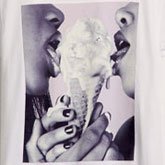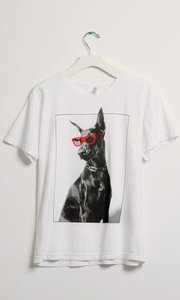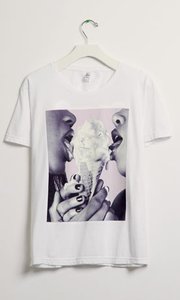Klotz Joins American Apparel, Puts Freshjive on Hiatus
Provocative and influential designer Rick Klotz spent his career as the brains behind the fiercely independent brand Freshjive, but for his next move he will become an employee of American Apparel Inc.
Klotz, one of the pioneers of the burgeoning style of streetwear fashion, joined American Apparel to lead its new printed T-shirt division. He will put the Los Angeles–based Freshjive on hiatus.
In his new position at American Apparel, Klotz will design the company’s The Graphic Collection. It is American Apparel’s first foray into a full graphic T-shirt collection. Previously, American Apparel printed simple slogans on its shirts. The majority of its styles are blank T-shirts with no images.
Klotz’s close association with American Apparel started last month when he and American Apparel founder Dov Charney announced in a video that American Apparel had licensed Klotz’s surfwear company, Warriors of Radness, for an undisclosed amount.
In a recent interviewwith CaliforniaApparel News, Klotz said thatputting his entire label on hiatus and becoming an employee of a public companythat runs a fleet of 251 stores across the world should save him from filingfor bankruptcy.
Klotz declined to sayhow much debt he and the Freshjive company were in. Despite pioneeringstreetwear and inspiring a generation of designers, the company remained asmall business. In 1996, the label’s top year of financial performance, it made$14.5 million in gross sales, Klotz said. In 2011, the label made $3 million ingross sales.
While the Australianlicenser for Freshjive remains in business, seven of Klotz’s American Freshjiveworkers followed him to work at American Apparel. A couple of Freshjivestaffers lost their jobs, and Klotz said he hopes the remaining Freshjivestaff, about four people, will be hired by American Apparel.
Klotz has consistentlyreceived praise for his design work throughout his 23-year career. GQ magazine nominated him as one of the"Best New Menswear Designers in America" in 2011 for his Warriors ofRadness brand.
“[Freshjive] wasone of the all-time iconic streetwear brands,” said Aaron Levant, president ofthe Agenda trade show, the top show for streetwearfashions. “His concepts and his artistic nature are more important to him thanmaking a dime. He is not concerned with just making what will sell.”
Klotz said herepeatedly chose to support art over commerce when guiding his company’sdirections.
“I’m to blame, forvarious reasons,” he said of Freshjive’s declining sales. “Maybe a designer ishis worst enemy when he owns his own company. Art is governed by emotions, notsales.”
Klotz startedFreshjive in 1989 after exhibiting some of his unique T-shirts at the Action SportsRetailertrade show in SanDiego, then the top trade event for surf and skatewear. Klotz was a hit;he left the show with $300,000 in orders. He soon dropped out of Otis ParsonsSchool of Art & Design, now calledOtis College of Art & Design, to join forces with his father, Jorge Klotz,a small contractor in downtown Los Angeles, to build Freshjive.
Unlike otheryouth-oriented labels, Freshjive blurred categories between surf, skatewear andfashion long before it was in vogue to do so. However, he questioned his careerpath when he read “No Logo,” a critique of consumer culture by Canadian authorNaomi Klein.
“There I am, makingbranded clothes and trying to convince a young guy that he’s cooler if he wearsmy clothes. That’s not me,” Klotz said. He later left his company in the handsof his father in 2004 to travel and make art. He returned in 2005 to lead thecompany only after his father died of a heart attack.
But Klotz felt that hehad more purpose when he returned. “If I’m going to come back to this company,I’ve got to make it a personal expression. I started doing very opinionatedT-shirts,” he said. “I became that guy doing heavy communications on T-shirts.”
In 2005, he parodied the logo of another pioneering streetwear company, Stüssy, and was sued for trademark infringement. Thesuit was settled out of court later that year, and Klotz said he did not payany damages, but he promised not to parody the Stüssy logo again.
In 2008, Klotz, a Jew,made a T-shirt bearing the likeness of Yasser Arafat, leader of the PalestineLiberation Organization, with the enigmatic slogan “Like the Good Ol’ Days!”Controversial political group Jewish Defense League picketed his store, Reserve, located on Los Angeles’ FairfaxAvenue. Reserve shuttered in April.
In a statement againstbranding, he announced he would drop the Freshjive logo and replace it with theimage of a plain black box, which would be printed on all of Freshjive 'sT-shirts.
But at AmericanApparel, which was well-known for provocative advertising campaigns, Klotz saidhe would not seek to shock with images. “With my own company, it made sense tohave personal expression. But American Apparel has its own identity, and that'swhat I’m focused on. I’m stoked.”
More information about The Graphic Collection can be foundhere.
























